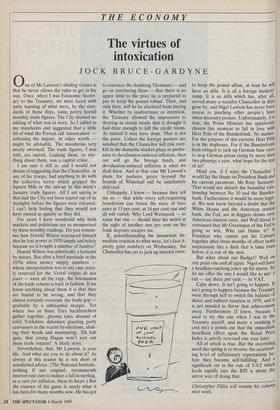THE ECONOMY
The virtues of intoxication
JOCK BRUCE-GARDYNE I am sure it still is: and I would not dream of suggesting that the Chancellor, or any of his troops, had anything to do with the collective terror which gripped the Square Mile in the run-up to this week's January trade figures. All I am saying is that had the City not been scared out of its daylights before the figures were released, I can't help feeling that they would not have passed as quietly as they did.
For years I have wondered why both markets and politicians are so mesmerised by these monthly readings. Do you remem- ber how Harold Wilson convinced himself that he lost power in 1970 simply and solely because we'd bought a number of Jumbos?
Harold Wilson was admittedly a fantasist by nature. But after a brief interlude in the 1970s when money supply numbers whose interpretation was in any case strict- ly reserved for the Vestal virgins de nos jours — were all the rage, the fascination of the trade returns is back in fashion. If we know anything about them it is that they are bound to be wrong, and that they almost certainly overstate the trade gap probably by a substantial margin. Yet where two or three Tory backbenchers gather together, gloomy tales abound of solid Yorkshire dalesmen greeting party canvassers in the recent by-elections, shak- ing their heads and murmuring, 'Eh bah gum, that young Hague won't sort out them trade returns!' A likely story.
Nevertheless, that, Mr Lawson, is your life. And what are you to do about it? As always at this season he is not short of unsolicited advice. (The National Institute, nothing if not original, recommends interest-rate cuts to induce a fall in sterling, as a cure for inflation, bless its heart.) But the essence of the game is surely what it has been for many months now. He has got
to convince the doubting Thomases — and go on convincing them — that there is no upper limit to the price he is prepared to pay to keep the pound robust. Then, and only then, will he be absolved from paying it. Whether by inadvertance or intention, the Treasury allowed the impression to develop in recent weeks that it thought it had done enough to kill the credit boom. As indeed it may have done. That is not the point. Unless the foreign punters are satisfied that the Chancellor will risk over- kill in the domestic market-place in prefer- ence to devaluation-induced inflation, then out will go the foreign funds, and devaluation-induced inflation is what we shall have. And in that case Mr Lawson's plans for pastures green beyond the bounds of Whitehall will be indefinitely deferred.
Unhappily, I know — because they tell me so — that while every self-respecting boardroom can breast the wave of base rates at 13 per cent, at 14 per cent one and all will vanish. Why Lord Weinstock — to name but one — should dree his weird at the sight of another one per cent on his bank deposits escapes me.
If, notwithstanding the insouciant im- mediate reaction to what were, let's face it, pretty grim numbers on Wednesday, the Chancellor has yet to jack up interest rates, to keep the pound afloat, at least he will have an alibi. It is all a foreign bankers' ramp. It is an alibi which has, after all served many a socialist Chancellor in days gone by, and Nigel Lawson has never been averse to pinching other people's lines when necessity presses. Unfortunately, it is true, the Prime Minister has apparently chosen this moment to fall in love with Herr Pohl of the Bundesbank. No matter. For the purpose of this exercise Herr Pal is in the doghouse. For if the Bundesbank feels obliged to jack up German base rates to stop German prices rising by more than two pfennigs a year, what hope for the rest of us?
Mind you, if I were the Chancellor I would lay the blame on President Bush and his current paramour, Ms Rosy Scenario. That would not disturb the beautiful rela- tionship between No 10 and the Bundes- bank. Furthermore it would be more logic- al. We now know beyond a doubt that the White House and the American central bank, the Fed, are at daggers drawn over American interest rates, and Wall Street is convinced that Mr Greenspan of the Fed is going to win. Who can blame it? A President who cannot put his Cabinet together after three months of effort looks suspiciously like a duck that is lame even before it is out of the nest.
But what about our Budget? Well on one point one and all agree. Nigel will have a headline-catching joker up his sleeve. So let me offer the one I would like to see: a cut — say three per cent — in VAT. Calm down. It isn't going to happen. It isn't going to happen because the Treasury went through hell to switch the balance of direct and indirect taxation in 1979, and it is not minded to throw that achievement away. Furthermore (I know, because I used to try this one when I was in the Treasury myself, and many a swishing it cost me) it points out that the immediate beneficial effect upon the Retail Price Index is utterly reversed one year later.
All of which is true. But the overriding need this spring is to reverse the accelerat- ing level of inflationary expectations be- fore they become self-fulfilling. And a significant cut in the rate of VAT which feeds rapidly into the RPI is about the surest way of doing that.
















































 Previous page
Previous page